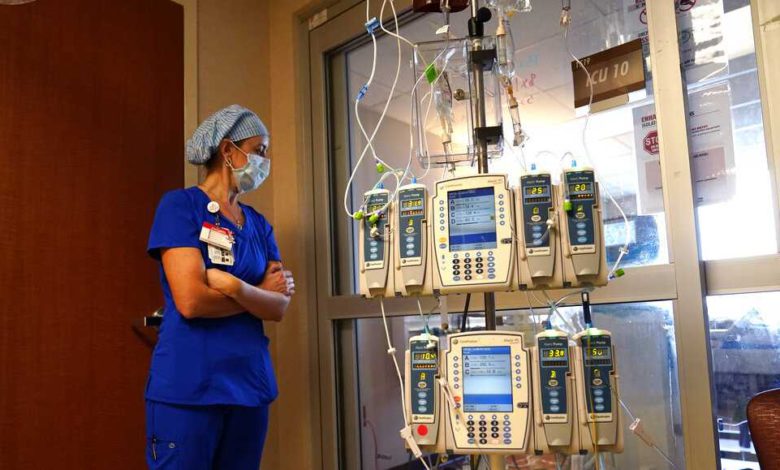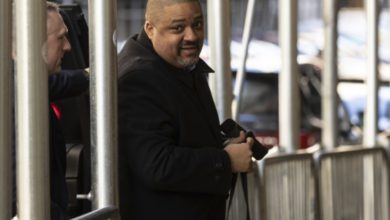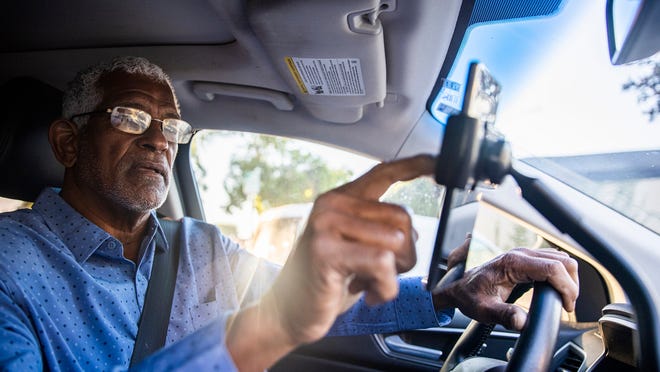

Some governors are beginning to report encouraging signs in their state's COVID-19 numbers, but warn of what could come next if more people don't get vaccinated.COVID-19 hospitalizations and ICU utilization have decreased over the past week in Kentucky, Gov. Andy Beshear announced at a Thursday news conference."We are in a decline and we hope it continues for people hospitalized because of COVID," the governor said."This is more people getting vaccinated. This is more people wearing their masks. Keep it up," Beshear added, warning COVID-19 hospitalization and ICU numbers in the state are still very high and could tick back up.Also Thursday, Maryland Gov. Larry Hogan announced the state's COVID-19 positivity rate has dropped 20% in the past month and hospitalizations are down 60% from their peak. On the same day, Georgia Gov. Brian Kemp said that while the state has seen a "significant decline in cases, hospitalizations and percent positive tests" in the past weeks, there could be another surge soon."Today, I want to emphasize the importance of not waiting until the next wave of COVID cases to get vaccinated," Kemp said. "Given that our increase in cases and hospitalizations in 2021 were similar in timing to surges seen in 2020, we can only assume that a winter increase is also possible."Across the U.S., the rate of new COVID-19 deaths is expected to decrease over the next four weeks, according to an ensemble forecast from the Centers for Disease Control and Prevention. And for the third week in a row, Wednesday's CDC forecast predicted hospitalizations will decrease as well — a bit of hope as the more transmissible Delta variant continues to spread.But currently, an average of nearly 2,000 people die and about 114,000 people are infected with COVID-19 every day, according to data from Johns Hopkins University."We're going to lose a bunch more people," West Virginia Gov. Jim Justice said at a news briefing Wednesday. "All I can possibly do, with a good conscience, is continue to urge you, in every way, to get vaccinated."Roughly 55.5% of the U.S. population is fully vaccinated, according to the CDC. Health experts can't say for sure what proportion of the population would need to be vaccinated to control the spread, but Dr. Anthony Fauci estimates that it would have to be the "vast majority."Officials and experts are employing multiple strategies to try to increase vaccination protection.Schools, businesses and employers have implemented mandates for students and employees to be vaccinated against the virus. And the FDA has authorized booster doses to increase vaccine protection for vulnerable populations.About a third of parents say they'd vaccinate kids ages 5-11 right away, poll findsMeanwhile, a slightly increasing proportion of parents may be open to children ages 5-11 getting a COVID-19 vaccine as soon as one is available to them, according to a new Kaiser Family Foundation poll.No COVID-19 vaccine is yet authorized for ages under 12 in the U.S. But both Pfizer and Moderna have been testing various doses of their COVID-19 vaccines in children under 12, and health experts have said one could be authorized for ages 5-11 later this fall if multiple federal agencies sign off.In a Kaiser poll published Thursday, about 34% parents of children 5-11 said they would vaccinate their child as soon as a COVID-19 vaccine became available for that age group.That's up from 26% who said the same thing in a July poll, the foundation said. About 32% of September's respondents said they would wait to see how the vaccine was working, against 40% who said the same thing in July.The percentage of parents saying they definitely wouldn't seek the vaccine for their child this age group, however, has barely moved. About 24% of respondents said this in September, versus 25% in July, Kaiser said.About 7% in September said they'd allow their child to get the vaccine only if required, against 9% who said the same in July.Kaiser noted that the bulk of the interviews for September's poll happened before Pfizer announced on Sept. 20 that its COVID-19 vaccine was safe and generated a "robust" antibody response in children ages 5-11. Pfizer is now submitting that data to the FDA ahead of anticipated attempt to seek the agency's authorization for vaccinating this age group.The latest Kaiser poll was conducted Sept. 13-22.Vaccine deadline in effect for California health care workersOn the local and federal level, officials are implementing vaccination mandates to increase protection.In California, Sept. 30 was the deadline for health care facility workers to complete a COVID-19 vaccination series — unless they receive an exemption — to keep working.The deadline included anyone who works at a health care facility, including hospitals, long- and intermediate-care facilities and doctor offices and clinics.Under an order issued Aug. 5, the state health department ordered workers to have a second dose of a two-dose mRNA COVID-19 vaccine, or a single shot of the one-dose Johnson & Johnson vaccine, by Sept. 30.The order allowed workers to ask for exemptions based on religious beliefs or qualifying medical reasons. Anyone granted an exemption was required to submit to regular COVID-19 testing: Twice a week for workers in acute health care and long-term care settings, and once weekly for workers in other health care settings.Earlier this month, President Joe Biden announced stringent new vaccine rules on federal workers, large employers and health care staff in a sweeping attempt to contain COVID-19.He directed the Labor Department to require all businesses with 100 or more employees ensure their workers are either vaccinated or tested once a week. Companies could face thousands of dollars in fines per employee if they don't comply.Biden also said he would require the 17 million health care workers at facilities receiving funds from Medicare and Medicaid to be fully vaccinated, expanding the mandate to hospitals, home care facilities and dialysis centers around the country.Those requirements are still weeks away from being implemented, but employers should expect them to come this year, White House press secretary Jen Psaki said Wednesday.New York state ordered staff at hospitals and long-term care facilities to receive at least one COVID-19 vaccine dose by last week, unless they received exemptions for medical or religious reasons. Some employees are already facing the consequences of not complying.The St. Barnabas Hospital Health System had 58 employees who failed to show proof of vaccination as of Wednesday, spokesman Steve Clark said. The employees were suspended and have until Monday morning to show proof of vaccination. If they don't, they'll be terminated, Clark said."Patient care has not been compromised at all," Clark said. "Schedules have been created accordingly. People will work overtime, or part-timers or agency personnel will be brought in when necessary."No health care facility in the state has closed as a result of any staffing shortages resulting from people not complying with the vaccine requirements, Gov. Kathy Hochul said Thursday.As of Monday evening, 92% of nursing home staff, 89% of adult care facilities staff, and 92% of hospital staff had received at least one COVID-19 vaccine dose, the governor's office said.New York officials are looking into expanding the vaccine requirement to health care workers at facilities that are not regulated state health department, such as prisons, Hochul said.
Some governors are beginning to report encouraging signs in their state's COVID-19 numbers, but warn of what could come next if more people don't get vaccinated.
COVID-19 hospitalizations and ICU utilization have decreased over the past week in Kentucky, Gov. Andy Beshear announced at a Thursday news conference.
"We are in a decline and we hope it continues for people hospitalized because of COVID," the governor said.
"This is more people getting vaccinated. This is more people wearing their masks. Keep it up," Beshear added, warning COVID-19 hospitalization and ICU numbers in the state are still very high and could tick back up.
Also Thursday, Maryland Gov. Larry Hogan announced the state's COVID-19 positivity rate has dropped 20% in the past month and hospitalizations are down 60% from their peak. On the same day, Georgia Gov. Brian Kemp said that while the state has seen a "significant decline in cases, hospitalizations and percent positive tests" in the past weeks, there could be another surge soon.
"Today, I want to emphasize the importance of not waiting until the next wave of COVID cases to get vaccinated," Kemp said. "Given that our increase in cases and hospitalizations in 2021 were similar in timing to surges seen in 2020, we can only assume that a winter increase is also possible."
Across the U.S., the rate of new COVID-19 deaths is expected to decrease over the next four weeks, according to an ensemble forecast from the Centers for Disease Control and Prevention. And for the third week in a row, Wednesday's CDC forecast predicted hospitalizations will decrease as well — a bit of hope as the more transmissible Delta variant continues to spread.
But currently, an average of nearly 2,000 people die and about 114,000 people are infected with COVID-19 every day, according to data from Johns Hopkins University.
"We're going to lose a bunch more people," West Virginia Gov. Jim Justice said at a news briefing Wednesday. "All I can possibly do, with a good conscience, is continue to urge you, in every way, to get vaccinated."
Roughly 55.5% of the U.S. population is fully vaccinated, according to the CDC. Health experts can't say for sure what proportion of the population would need to be vaccinated to control the spread, but Dr. Anthony Fauci estimates that it would have to be the "vast majority."
Officials and experts are employing multiple strategies to try to increase vaccination protection.
Schools, businesses and employers have implemented mandates for students and employees to be vaccinated against the virus. And the FDA has authorized booster doses to increase vaccine protection for vulnerable populations.
About a third of parents say they'd vaccinate kids ages 5-11 right away, poll finds
Meanwhile, a slightly increasing proportion of parents may be open to children ages 5-11 getting a COVID-19 vaccine as soon as one is available to them, according to a new Kaiser Family Foundation poll.
No COVID-19 vaccine is yet authorized for ages under 12 in the U.S. But both Pfizer and Moderna have been testing various doses of their COVID-19 vaccines in children under 12, and health experts have said one could be authorized for ages 5-11 later this fall if multiple federal agencies sign off.
In a Kaiser poll published Thursday, about 34% parents of children 5-11 said they would vaccinate their child as soon as a COVID-19 vaccine became available for that age group.
That's up from 26% who said the same thing in a July poll, the foundation said. About 32% of September's respondents said they would wait to see how the vaccine was working, against 40% who said the same thing in July.
The percentage of parents saying they definitely wouldn't seek the vaccine for their child this age group, however, has barely moved. About 24% of respondents said this in September, versus 25% in July, Kaiser said.
About 7% in September said they'd allow their child to get the vaccine only if required, against 9% who said the same in July.
Kaiser noted that the bulk of the interviews for September's poll happened before Pfizer announced on Sept. 20 that its COVID-19 vaccine was safe and generated a "robust" antibody response in children ages 5-11. Pfizer is now submitting that data to the FDA ahead of anticipated attempt to seek the agency's authorization for vaccinating this age group.
The latest Kaiser poll was conducted Sept. 13-22.
Vaccine deadline in effect for California health care workers
On the local and federal level, officials are implementing vaccination mandates to increase protection.
In California, Sept. 30 was the deadline for health care facility workers to complete a COVID-19 vaccination series — unless they receive an exemption — to keep working.
The deadline included anyone who works at a health care facility, including hospitals, long- and intermediate-care facilities and doctor offices and clinics.
Under an order issued Aug. 5, the state health department ordered workers to have a second dose of a two-dose mRNA COVID-19 vaccine, or a single shot of the one-dose Johnson & Johnson vaccine, by Sept. 30.
The order allowed workers to ask for exemptions based on religious beliefs or qualifying medical reasons. Anyone granted an exemption was required to submit to regular COVID-19 testing: Twice a week for workers in acute health care and long-term care settings, and once weekly for workers in other health care settings.
Earlier this month, President Joe Biden announced stringent new vaccine rules on federal workers, large employers and health care staff in a sweeping attempt to contain COVID-19.
He directed the Labor Department to require all businesses with 100 or more employees ensure their workers are either vaccinated or tested once a week. Companies could face thousands of dollars in fines per employee if they don't comply.
Biden also said he would require the 17 million health care workers at facilities receiving funds from Medicare and Medicaid to be fully vaccinated, expanding the mandate to hospitals, home care facilities and dialysis centers around the country.
Those requirements are still weeks away from being implemented, but employers should expect them to come this year, White House press secretary Jen Psaki said Wednesday.
New York state ordered staff at hospitals and long-term care facilities to receive at least one COVID-19 vaccine dose by last week, unless they received exemptions for medical or religious reasons. Some employees are already facing the consequences of not complying.
The St. Barnabas Hospital Health System had 58 employees who failed to show proof of vaccination as of Wednesday, spokesman Steve Clark said. The employees were suspended and have until Monday morning to show proof of vaccination. If they don't, they'll be terminated, Clark said.
"Patient care has not been compromised at all," Clark said. "Schedules have been created accordingly. People will work overtime, or part-timers or agency personnel will be brought in when necessary."
No health care facility in the state has closed as a result of any staffing shortages resulting from people not complying with the vaccine requirements, Gov. Kathy Hochul said Thursday.
As of Monday evening, 92% of nursing home staff, 89% of adult care facilities staff, and 92% of hospital staff had received at least one COVID-19 vaccine dose, the governor's office said.
New York officials are looking into expanding the vaccine requirement to health care workers at facilities that are not regulated state health department, such as prisons, Hochul said.
Source link






